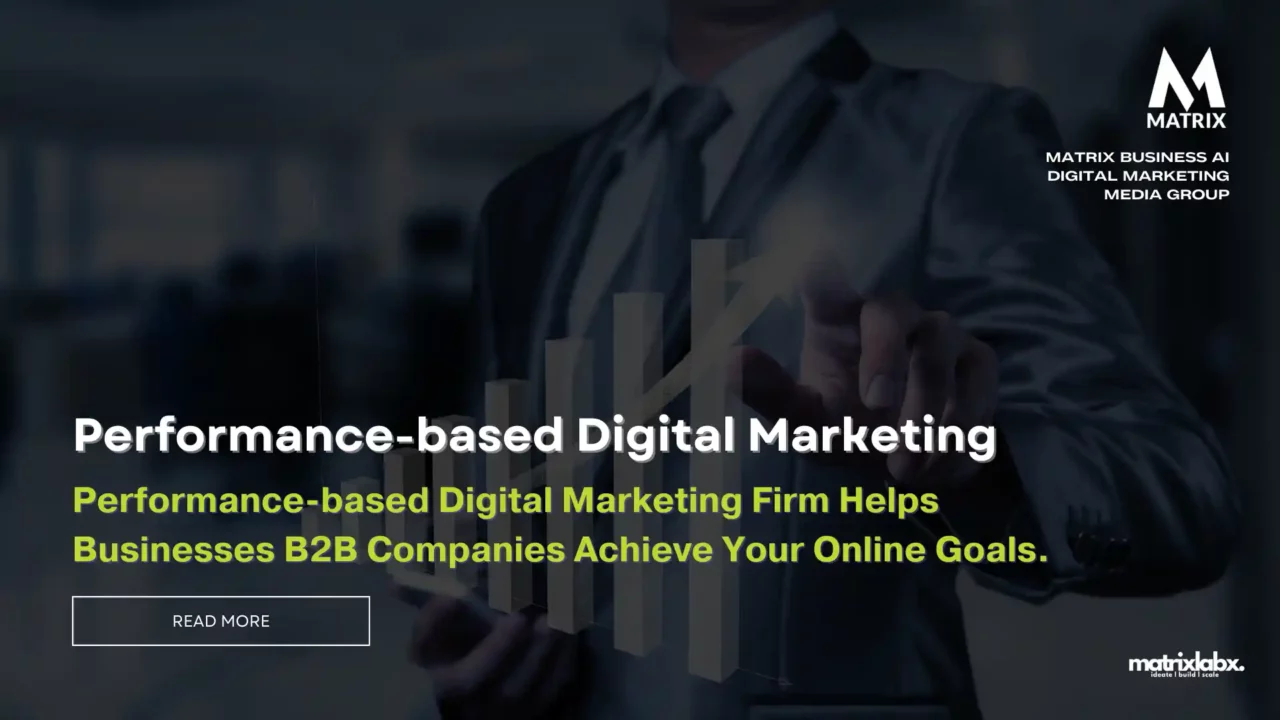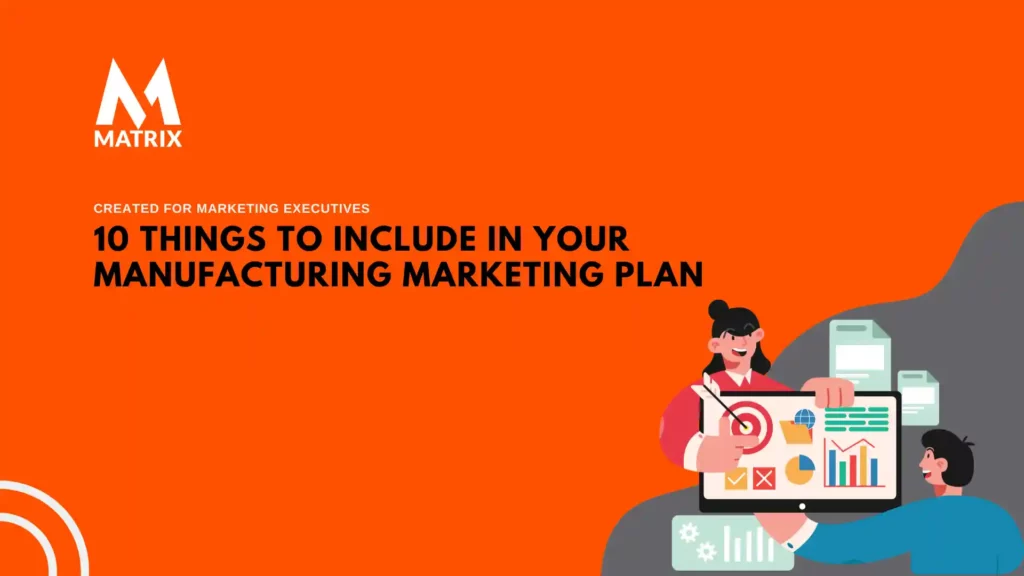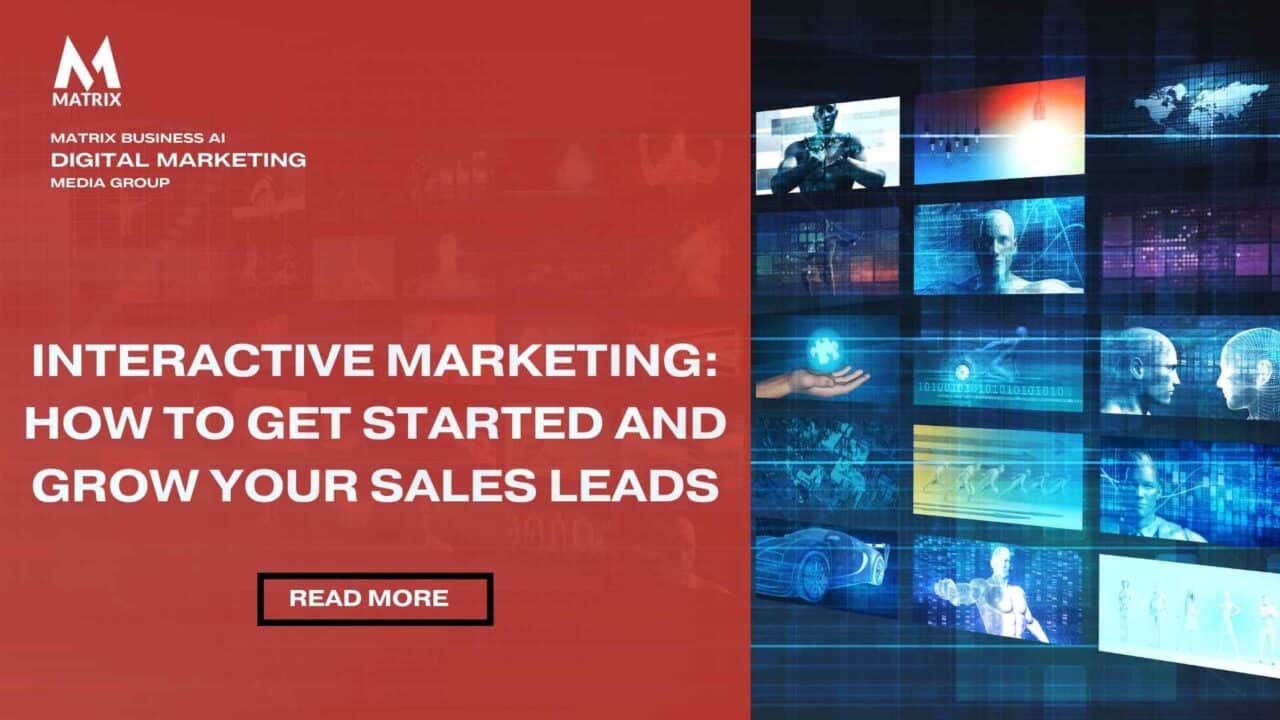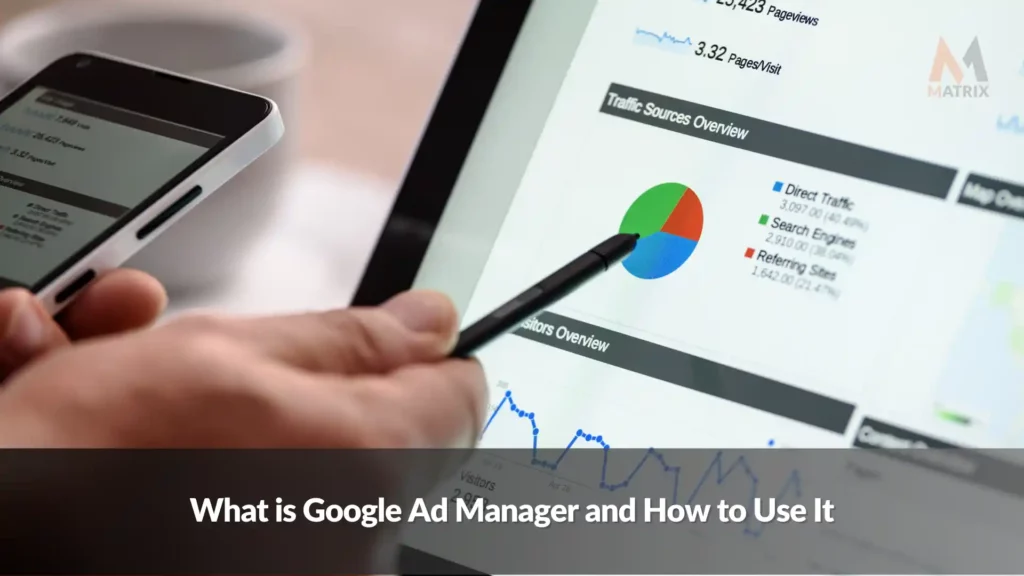Performance-based Performance-based Digital Marketing Firm Helps Businesses B2B Companies Achieve their Online Goals.
Learn About a Performance-based Digital Marketing Firm that Helps Businesses B2B Companies Achieve their Online Goals.
Digital Marketing for Businesses: A Comprehensive Guide to Navigating the Online Landscape
In today’s dynamic and interconnected world, businesses of all sizes are increasingly recognizing the transformative power of digital marketing.
As traditional marketing channels gradually cede ground to the pervasive influence of the internet, the ability to harness the potential of digital platforms has become an indispensable tool for success.
This comprehensive guide delves into the intricacies of digital marketing, providing businesses with a roadmap to navigate the ever-evolving online landscape and achieve their strategic objectives.
The Digital Marketing Landscape: A Realm of Opportunities
Digital marketing encompasses many strategies and tactics to promote and sell products or services through various online channels.
These channels include search engines, social media platforms, email marketing, content marketing, pay-per-click (PPC) advertising, and web design and development.

Better Search Ranking
Better Search Ranking in 90 days
SEO is extremely important for companies to rank on search because it is the primary way that people find information online.
At the heart of successful digital marketing lies a data-driven approach, where businesses meticulously analyze and interpret vast amounts of information to inform their strategies and optimize their campaigns.
This data-centric approach enables businesses to gain a deeper understanding of their target audience, identify market trends, and measure the effectiveness of their marketing efforts.
A. The Evolution of Digital Marketing
In the ever-evolving digital landscape, marketing strategies have undergone a paradigm shift.
The traditional methods, once the linchpins of advertising campaigns are now giving way to more agile, results-oriented approaches.
This evolution is particularly pronounced in the B2B sector, where the digital revolution has transformed how businesses interact with each other.
B. The Rise of Performance-Based Strategies in B2B Contexts
Amidst this metamorphosis, performance-based digital marketing has become a cornerstone for B2B companies.
Unlike traditional marketing, which often focuses on broad strategies and brand awareness, performance-based marketing focuses on concrete results and ROI, making it a quintessential tool for businesses aiming to solidify their online presence.
II. Understanding Performance-Based Digital Marketing
A. Definition and Core Principles
Performance-based digital marketing is a strategy where outcomes, such as leads, sales, or specific engagement metrics, are the primary drivers of the campaign.
This modus operandi hinges on measurable success, allowing businesses to align their marketing efforts directly with their business objectives.
B. Distinction from Traditional Marketing Models
This model significantly departed from conventional marketing methods, where outputs were less quantifiable.
By focusing on measurable outcomes, performance-based digital marketing ensures that every dollar spent is accountable, paving the way for more efficient and effective marketing strategies.
III. The Significance of Digital Marketing for B2B Companies
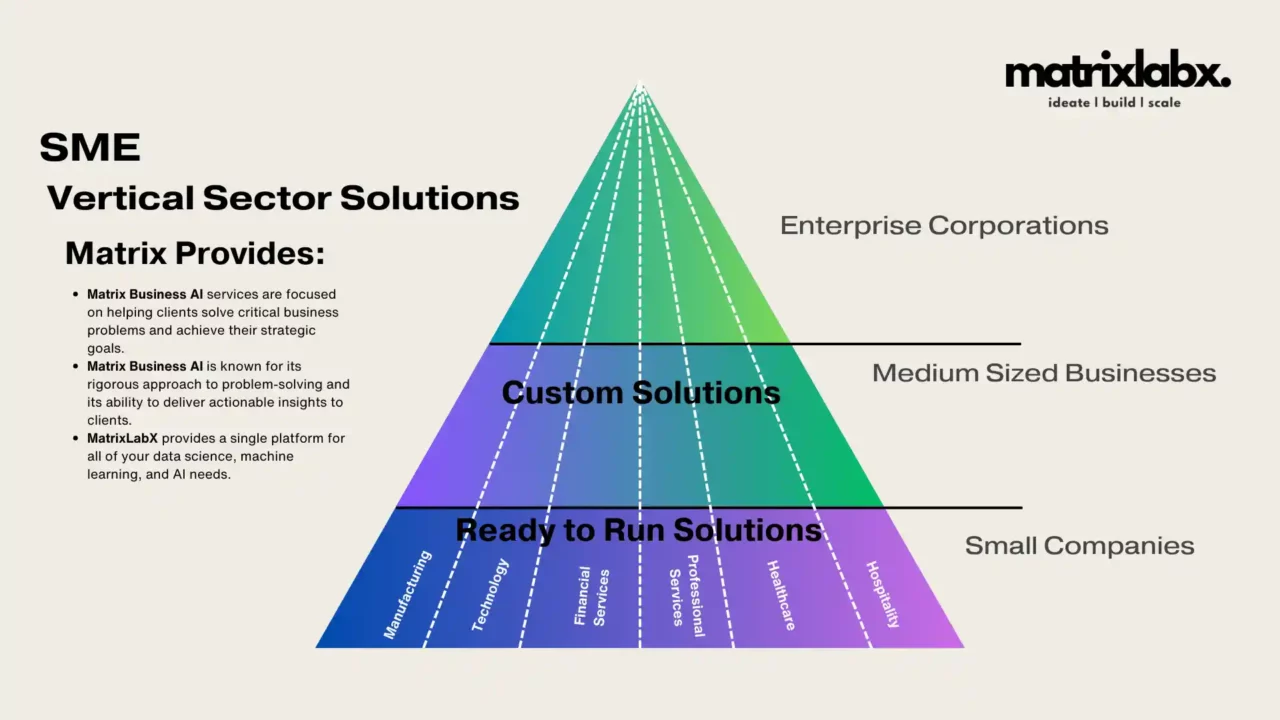
A. Digital Presence in the B2B Sector
In today’s digital age, a robust online presence is advantageous and essential for B2B companies.
In the digital arena, connections are forged, reputations are built, and deals are struck.
A strategic online presence enables B2B companies to reach their target audiences more effectively and establish themselves as industry leaders.
B. The Impact of Digital Strategies on B2B Operations
Implementing targeted digital strategies can significantly impact a B2B company’s operations, enhancing brand visibility, improving customer engagement, and driving sales.
The right digital approach can transform a company’s trajectory, opening new avenues for growth and success.
Are Your Marketing Efforts a Shot in the Dark? Let’s Turn on the Spotlight!
Imagine having the clarity of seeing your marketing strategy from a bird’s-eye view, understanding every nuance of your campaigns. Our comprehensive audit delves into the core of your marketing DNA, dissecting each campaign with surgical precision to identify the powerhouse strategies and weed out the underperformers.

What is Digital Strategy in B2B Operations?
Digital strategy in B2B operations encompasses the planning and implementing of digital technologies to enhance the efficiency, effectiveness, and competitiveness of business-to-business (B2B) processes.
It involves leveraging digital tools and platforms to streamline internal operations, improve customer interactions, and optimize sales and marketing efforts.
Why is Digital Strategy Important in B2B Operations?
Digital strategy has become increasingly crucial for B2B operations due to several factors:
- The Shifting B2B Buyer Landscape: B2B buyers are increasingly tech-savvy and expect digital interactions throughout the buying journey.
- The Rise of E-commerce and Online Marketplaces: E-commerce and online marketplaces have transformed how B2B businesses conduct transactions and reach customers.
- The Need for Data-Driven Decision-Making: Digital technologies generate vast amounts of data, which can be analyzed to gain insights into customer behavior, market trends, and campaign performance.
How Does Digital Strategy Impact B2B Operations?
Digital strategy impacts B2B operations in several ways:
- Streamlining Internal Processes: Digital tools can automate tasks, improve communication, and enhance collaboration, increasing productivity and cost savings.
- Enhancing Customer Experience: Digital platforms provide personalized customer experiences, enabling businesses to provide better support, resolve issues faster, and foster customer loyalty.
- Optimizing Sales and Marketing Efforts: Digital marketing tools allow for targeted campaigns, lead generation, and sales pipeline management, leading to improved conversion rates and revenue growth.
- Data-Driven Insights and Decision-Making: Digital data provides valuable insights into customer behavior, market trends, and campaign performance, enabling businesses to make informed decisions and optimize their strategies.
Key Examples of Digital Strategies in B2B Operations:
- Customer Relationship Management (CRM) Systems: CRMs centralize customer data, enabling businesses to track interactions, manage leads, and provide personalized service.
- Enterprise Resource Planning (ERP) Systems: ERPs integrate various business functions, such as finance, supply chain, and human resources, streamlining operations and improving efficiency.
- E-commerce Platforms: E-commerce platforms enable businesses to sell products or services directly to customers online, expanding their reach and convenience.
- Digital Marketing Automation Tools: These tools automate marketing tasks, such as email marketing, social media posting, and lead nurturing, freeing up time for strategic initiatives.
- Data Analytics and Business Intelligence Tools: These tools analyze vast amounts of data to provide insights into customer behavior, market trends, and campaign performance, enabling data-driven decision-making.
The Future of Digital Strategy in B2B Operations

Digital strategy will continue to evolve and play an increasingly important role in B2B operations. Emerging trends include:
- Artificial Intelligence (AI) and Machine Learning (ML): AI and ML will provide deeper customer insights, automate complex tasks, and personalize marketing and sales interactions.
- Internet of Things (IoT): IoT-enabled devices will generate real-time data, enabling businesses to optimize supply chains, monitor equipment performance, and improve customer service.
- Voice Search and Conversational Interfaces: Voice search and chatbots will revolutionize customer interactions, providing more natural and personalized experiences.
- Data Governance and Privacy: Businesses must ensure responsible data collection, usage, and protection to comply with privacy regulations and maintain customer trust.
B2B businesses that embrace digital strategies and adapt to these evolving trends will be well-positioned to succeed in the competitive and dynamic B2B marketplace.
By leveraging digital technologies effectively, B2B businesses can enhance their operations, improve customer relationships, and achieve their strategic goals.
IV. Services Offered by Performance-Based Digital Marketing Firms

A. SEO Optimization and Its Importance
Search engine optimization (SEO) is critical in ensuring a business’s visibility online. A performance-based digital marketing firm optimizes a B2B company’s website to rank higher in search engine results, thereby increasing organic traffic and potential leads.
B. Content Marketing Strategies
Content marketing involves creating relevant content tailored to a company’s target audience.
This strategy is pivotal in establishing thought leadership and nurturing customer relationships in the B2B realm.
AI-driven content uses artificial intelligence (AI) to produce and optimize content. This can include generating text, images, videos, and other forms of media, as well as assisting with tasks such as writing, editing, and proofreading.
AI-driven content is becoming increasingly popular as businesses and individuals seek to create more engaging and effective content. AI can help to automate repetitive tasks, improve the quality of content, and personalize it for specific audiences.
Benefits of AI-driven content
- Increased productivity: AI can automate many tasks in content creation, freeing time for humans to focus on more strategic work.
- Improved quality: AI can analyze data and patterns to generate more relevant, engaging, and effective content.
- Personalization: AI can personalize content for individual users or audiences based on their interests, preferences, and behavior.
- Scalability: AI can help to create and distribute large amounts of content quickly and efficiently.
Applications of AI-driven content
- Content marketing: AI can generate blog posts, articles, social media posts, and other forms of marketing content.
- Product descriptions: AI can be used to generate product descriptions that are informative, persuasive, and keyword-rich.
- Customer service: AI can be used to create chatbots and other forms of self-service customer support.
- Education: AI can create personalized learning experiences like adaptive learning and AI-powered tutors.
Examples of AI-driven content tools
- Grammarly: Grammarly is an AI-powered writing assistant that can help you improve your grammar, spelling, and style.
- AIContentPad: AIContentPad is an AI-powered content creation tool that helps businesses create high-quality content more efficiently. It uses natural language processing (NLP) and machine learning algorithms to generate text, translate languages, write creative content, and answer your questions informally.
- Jasper: Jasper is an AI-powered copywriting tool that can help you generate marketing copy, such as blog posts, social media posts, and website copy.
- Synthesia: Synthesia is an AI-powered video creation tool that can help you create realistic-looking video avatars for training videos, marketing presentations, and other forms of content.
The future of AI-driven content
AI is rapidly evolving, and its impact on content creation will only grow in the future. We can expect to see AI-powered tools that can generate even more creative and sophisticated content, as well as tools that can better understand and respond to the needs of individual users.
AI-driven content has the potential to revolutionize the way we create, consume, and interact with information. As AI continues to develop, we can expect to see even more innovative and transformative applications of this technology in the world of content.
C. Social Media Management and Engagement
Social media platforms are potent tools for building brand awareness and engaging customers. A performance-based approach to social media ensures that every post, tweet, or update contributes to overarching business goals.
Social media management and engagement are crucial aspects of modern business operations, enabling brands to connect with their target audience, build brand awareness, and drive business growth.
Why is Social Media Management Important?
- Brand Awareness and Visibility: Social media provides a powerful platform to showcase your brand, products, and services to a vast and diverse audience. You can increase brand visibility and establish a strong online presence by consistently posting engaging content.
- Audience Engagement and Community Building: Social media allows you to interact directly with your target audience, foster a sense of community, and build meaningful relationships. Responding to comments, addressing concerns, and encouraging discussions foster customer loyalty and advocacy.
- Lead Generation and Sales: Social media can be a valuable tool for generating leads and driving sales. You can attract new business opportunities by sharing valuable content, running targeted ads, and engaging with potential customers.
- Reputation Management and Customer Service: Social media is a channel for managing your brand’s reputation and providing excellent customer service. Addressing negative feedback promptly, resolving issues efficiently, and demonstrating customer care can enhance your brand’s image.
- Competitive Analysis and Market Research: Social media provides insights into competitor activities, industry trends, and customer preferences. You can gain a competitive edge and make informed business decisions by monitoring conversations and analyzing data.
When is Social Media Management Important?
Social media management is crucial throughout the business lifecycle, from establishing a new brand to maintaining a successful enterprise.
- Startups and Emerging Businesses: Social media is essential for startups to establish a presence, attract early adopters, and build a loyal customer base.
- Established Businesses: Social media helps maintain brand relevance, engage with existing customers, and acquire new ones.
- Crisis Management: Social media can be a double-edged sword during crises. Effective social media management involves promptly addressing issues, communicating transparently, and rebuilding trust.
How to Effectively Manage Social Media Engagement
- Define Your Goals: Define your social media objectives, whether increasing brand awareness, generating leads, or enhancing customer service.
- Identify Your Target Audience: Understand your audience’s demographics, interests, and online behavior to effectively tailor your content and messaging.
- Create Engaging Content: Develop a content strategy that includes informative, entertaining, and interactive content to capture attention and encourage engagement.
- Optimize Posting Times: Schedule posts when your audience is most active to maximize visibility and engagement.
- Monitor and Respond: Regularly monitor social media conversations, respond promptly to comments and messages, and address concerns effectively.
- Analyze and Adapt: Regularly review social media analytics to measure the effectiveness of your efforts and adapt your strategy accordingly.
- Utilize Social Media Management Tools: Leverage management tools to streamline content scheduling, track engagement metrics, and manage multiple social media accounts efficiently.
- Collaborate with Influencers: Partner with relevant influencers in your industry to reach a wider audience and enhance brand credibility.
- Track and Measure Results: Continuously monitor key metrics such as follower growth, engagement rates, and website traffic to evaluate the impact of your social media efforts.
- Stay Updated and Adapt: Social media trends and platforms evolve rapidly. Keep up with the latest developments and adapt your strategy accordingly.
D. Pay-per-click (PPC) Campaigns

PPC campaigns are an integral part of performance-based digital marketing.
These campaigns enable B2B companies to place ads strategically across digital platforms, paying only when a user engages with the ad, thereby ensuring a high ROI.
What is PPC?
Pay-per-click (PPC) is an online advertising model in which advertisers pay a fee each time their ads are clicked. PPC is a way of buying visits to your site instead of earning them organically through search results.
How PPC Campaigns Work
PPC campaigns allow advertisers to bid on specific keywords or phrases they want their ads to appear for in search engine results pages (SERPs). When a user searches for one of those keywords or phrases, the advertiser’s ad will appear at the top of the SERP. The advertiser is then charged a fee each time a user clicks on their ad.
Why PPC Campaigns Are Important
PPC campaigns are important for several reasons:
- They can help you reach a highly targeted audience. When you use PPC, you can target your ads to people actively searching for keywords related to your products or services. This means that your ads are more likely to be seen by people interested in what you offer.
- They can help you get results quickly. Unlike organic search engine optimization (SEO), which can take months or even years to see results, PPC can start generating traffic to your site immediately. This can be especially helpful if you are a new business or launching a new product or service.
- They can be a cost-effective way to advertise. With PPC, you only pay when someone clicks on your ad. This means you can control your budget and only pay for the traffic you generate.
When to Use PPC Campaigns
PPC campaigns can be a valuable tool for businesses of all sizes. However, they are only sometimes the right solution for every business. Here are a few things to consider before starting a PPC campaign:
- Your goals. What do you hope to achieve with your PPC campaign? Are you looking to drive traffic to your website, generate leads, or increase sales?
- Your target audience. Who are you trying to reach with your ads?
- Your budget. How much are you willing to spend on your PPC campaign?
- Your time commitment. PPC campaigns require ongoing management. Can you dedicate the time or resources to manage your campaign effectively?
Here are some additional tips for getting started with PPC:
- Choose the right keywords. Do your research to find keywords relevant to your business and that people are searching for.
- Create compelling ad copy. Your ads must be clear, concise, and persuasive to get people to click.
- Set your bids carefully. The amount you bid for keywords will affect how often your ads are shown and how much you pay per click.
- Track your results. Use analytics tools to track your PPC campaign performance and adjust as needed.
PPC can be a powerful tool for businesses looking to reach a wider audience and achieve their marketing goals. However, it is important to use PPC wisely and to be prepared to make ongoing adjustments to your campaign.
E. Email Marketing Techniques
Email marketing remains a powerful tool in the B2B marketer’s arsenal. Performance-based email marketing focuses on crafting personalized, relevant emails that drive engagement and conversions.
Email Marketing: Nurturing Relationships and Driving Conversions
Email marketing remains a potent tool for businesses to nurture relationships with existing customers and prospects.
By segmenting their email lists and crafting personalized messages, businesses can drive conversions, promote new products or services, and maintain top-of-mind awareness.
AI-driven email marketing techniques are becoming increasingly important as businesses seek to improve the effectiveness of their email campaigns and maximize engagement with their target audience.
These techniques leverage the power of artificial intelligence to automate tasks, personalize email content, and optimize send times, resulting in more relevant and impactful messaging.
Why AI-driven Email Marketing Techniques are Important
- Increased Personalization: AI allows marketers to analyze vast customer data to create highly personalized email campaigns catering to individual preferences, interests, and behaviors. This personalized approach leads to higher open, click-through, and conversion rates.
- Automated Workflows: AI can automate repetitive tasks associated with email marketing, such as segmentation, scheduling, and follow-up emails. This automation frees marketers’ time to focus on more strategic initiatives and improve overall campaign efficiency.
- Predictive Analytics: AI algorithms can analyze customer data to predict customer behavior and identify patterns, allowing marketers to send targeted emails at opportune times. This predictive approach maximizes the likelihood of engagement and conversion.
- Content Optimization: AI can assist in optimizing email content, including subject lines, body copy, and calls to action, based on real-time data and performance insights. This optimization ensures the content is relevant engaging, and drives desired actions.
- Improved Deliverability: AI can help improve email deliverability by identifying and filtering out spammy content, ensuring that emails reach their intended recipients and avoid being sent to spam folders.
When to Use AI-driven Email Marketing Techniques
AI-driven email marketing techniques are particularly beneficial for businesses with large email lists who handle a high volume of email campaigns or need more resources to personalize their messaging manually.
AI can help these businesses overcome these challenges and achieve better results from their email marketing efforts.
Examples of AI-driven Email Marketing Techniques
- AI-powered subject line generation: AI algorithms can generate catchy and personalized subject lines more likely to catch the recipient’s attention and increase open rates.
- Personalized product recommendations: AI can analyze customer purchase history and browsing behavior to recommend relevant products in email campaigns, driving sales and customer satisfaction.
- Adaptive send times: AI algorithms can predict the optimal time to send emails based on individual recipient preferences and past engagement patterns, maximizing the likelihood of opens and clicks.
- Automated segmentation: AI can automatically segment email lists based on demographics, interests, and behaviors, allowing targeted messaging and increased personalization.
- Spam filtering: AI can identify and filter out spammy content in email campaigns, improving deliverability and protecting the sender’s reputation.
AI-driven email marketing techniques offer a powerful and effective way for businesses to improve the performance of their email campaigns, enhance customer engagement, and achieve their marketing goals.
F. Data Analytics and Reporting
Data analytics and reporting are the backbones of performance-based marketing.
These processes enable firms to track campaign performance, glean insights, and make data-driven decisions to optimize strategies continually.
V. Tailoring Strategies to B2B Needs
A. Understanding the B2B Buyer’s Journey
The B2B buyer’s journey is markedly different from that of a typical consumer. It’s longer, involves more stakeholders, and requires a nuanced understanding of the business’s needs.
Performance-based marketing strategies are tailored to navigate this complex journey effectively.
Why Understanding the B2B Buyer’s Journey is Important
Understanding the B2B buyer’s journey is crucial for businesses to effectively market their products or services and successfully convert leads into customers. By comprehending the stages a B2B buyer goes through before making a purchase, businesses can tailor their messaging, content, and interactions to address the buyer’s specific needs and pain points at each stage. This personalized approach fosters trust, builds relationships, and increases the likelihood of closing deals.
What is the B2B Buyer’s Journey?
The B2B buyer’s journey is the process a business goes through when making a purchasing decision. It typically involves three stages:
- Awareness Stage: The buyer becomes aware of a problem or challenge they face.
- Consideration Stage: The buyer researches and evaluates potential solutions to their problem.
- Decision Stage: The buyer selects a solution and makes a purchase.
When to Map the B2B Buyer’s Journey
Mapping the B2B buyer’s journey is essential for businesses to align their marketing and sales efforts with the buyer’s decision-making process. By identifying the buyer’s touchpoints, motivations, and objections at each stage, businesses can:
- Create targeted content: Develop content that addresses the buyer’s specific needs and concerns at each stage of their journey.
- Optimize lead nurturing: Engage with leads with personalized messages and interactions that move them through the buying process.
- Align sales and marketing: Ensure that marketing and sales teams are working together to provide a consistent and seamless customer experience.
- Improve campaign performance: Measure and analyze the effectiveness of marketing and sales campaigns at each stage of the buyer’s journey to identify areas for improvement.
Benefits of Understanding the B2B Buyer’s Journey
Understanding the B2B buyer’s journey offers numerous benefits for businesses, including:
- Increased sales and conversion rates: By addressing the buyer’s needs at each stage, businesses can increase the likelihood of closing deals and converting leads into customers.
- Improved customer satisfaction and retention: By providing a personalized and seamless buying experience, businesses can foster customer loyalty and encourage repeat business.
- Reduced marketing and sales costs: By targeting messaging and interactions effectively, businesses can optimize their resource allocation and reduce marketing and sales expenses.
- Enhanced brand reputation: By demonstrating a deep understanding of their customers’ needs and challenges, businesses can strengthen their brand reputation and attract new customers.
Understanding the B2B buyer’s journey is a critical component of successful B2B marketing and sales strategies. By mapping the buyer’s journey, creating targeted content, and aligning sales and marketing efforts, businesses can effectively guide buyers through the decision-making process, increase conversions, and build lasting customer relationships.
C. Integrating Sales and Marketing Efforts
For B2B companies, aligning sales and marketing efforts is crucial. Performance-based marketing firms often work closely with sales teams to ensure that marketing strategies dovetail seamlessly with sales objectives.
VI. Measurable Outcomes: The Heart of Performance-Based Marketing
A. Key Performance Indicators (KPIs) in B2B Marketing
In performance-based marketing, KPIs are essential in measuring the success of campaigns. These indicators include lead generation, conversion rates, website traffic, and customer engagement metrics.
B. The Importance of ROI in Performance Metrics
ROI is the lodestar of performance-based marketing. Firms focus on strategies that deliver tangible financial returns, ensuring marketing investments directly contribute to the company’s bottom line.
C. Continuous Improvement through Data
Data is not just for measurement; it’s for continuous improvement. Performance-based marketing firms use data analytics to refine and optimize strategies over time, ensuring they adapt to changing market dynamics and customer behaviors.
VII. Case Studies: Success Stories in B2B Digital Marketing
A. SEO Successes
Case studies in SEO often showcase how strategic optimizations led to increased organic traffic, higher search rankings, and improved lead quality.
B. Content Marketing Wins
In content marketing, success stories might illustrate how thought leadership and targeted content strategies elevated a brand’s industry standing and fostered customer loyalty.
C. PPC Campaign Triumphs
PPC triumphs are often about how targeted ad placements and optimized bidding strategies resulted in high conversion rates and substantial ROI.
VIII. Choosing the Right Digital Marketing Partner
A. Evaluating Expertise and Track Record
Assessing a digital marketing partner’s expertise and track record is crucial when selecting a digital marketing partner. This involves examining their experience in the B2B sector, case studies, and client testimonials.
B. Understanding the Firm’s Approach to Performance
Understanding a firm’s approach to performance-based marketing is key. This includes their methods of measuring success, data analytics use, and adaptability to changing market trends.
C. Aligning Goals and Expectations
Successful partnerships hinge on aligned goals and expectations. B2B companies should ensure that their digital marketing partner understands and is equipped to meet their unique business objectives.
Search Engine Optimization (SEO): Unlocking Organic Visibility
SEO plays a pivotal role in digital marketing, ensuring that a business’s website appears prominently in search engine results pages (SERPs).
Businesses can enhance their visibility to potential customers seeking relevant information or products by optimizing website content, structure, and backlinks.
Pay-per-click (PPC) Advertising: Targeted Traffic Acquisition
PPC advertising offers businesses a direct route to acquiring targeted traffic.
By placing ads on search engines and social media platforms, businesses can reach their target audience with laser-focused precision, ensuring their marketing efforts align with their ideal customer profiles.
Social Media Marketing: Engaging the Online Community
Social media platforms have become powerful tools for businesses to connect with their target audience, foster brand loyalty, and drive engagement.
Businesses can cultivate a vibrant online community and expand their reach by creating engaging content, interacting with followers, and running targeted social media ads.
Content Marketing: Establishing Expertise and Attracting Attention
Content marketing involves creating and sharing high-quality, informative, and relevant content to attract and engage a clearly defined target audience.
This content can take various forms, such as blog posts, articles, infographics, videos, and webinars. By consistently producing valuable content, businesses can establish themselves as industry experts, attract organic traffic, and nurture leads.
Marketing Automation: Streamlining Processes and Enhancing Efficiency
Marketing automation uses technology to automate repetitive marketing tasks, such as email marketing, social media posting, and lead nurturing.
This automation frees up valuable time for marketers to focus on more strategic initiatives while ensuring that marketing campaigns are executed consistently and effectively.

Web Design and Development: Creating a Compelling Digital Presence
A well-designed and user-friendly website is the cornerstone of a business’s online presence.
A professional web design enhances the user experience and plays a crucial role in SEO efforts, ensuring that the website is optimized for search engine algorithms.
Unleashing the Power of Digital Marketing: A Strategic Imperative
Digital marketing has revolutionized how businesses connect with their target audience, promote their products or services, and achieve their strategic objectives.
By embracing the ever-evolving digital landscape and employing a data-driven approach, businesses can unlock opportunities, foster growth, expand their reach, and solidifying their position in an increasingly competitive marketplace.
Future Trends in B2B Digital Marketing
A. Emerging Technologies and Platforms
Emerging technologies and platforms will shape the future of B2B digital marketing. Innovations in AI, machine learning, and new digital platforms will open new avenues for marketing strategies.
B. Predictive Analytics and AI in Marketing
Predictive analytics and AI are set to play a significant role in future B2B marketing strategies. These technologies will enable more precise targeting, personalized marketing, and efficient resource allocation.
C. The Role of Personalization and Automation
Personalization and automation will be key trends in the future of B2B digital marketing.
Tailored content and automated processes will enhance efficiency and effectiveness in marketing campaigns.
Conclusion
The Transformative Impact of Performance-Based Digital Marketing
Performance-based digital marketing can transform B2B companies’ online presence and operations.
By focusing on measurable outcomes and continuous improvement, these strategies ensure businesses reach their target audience and engage with them in meaningful, impactful ways.

